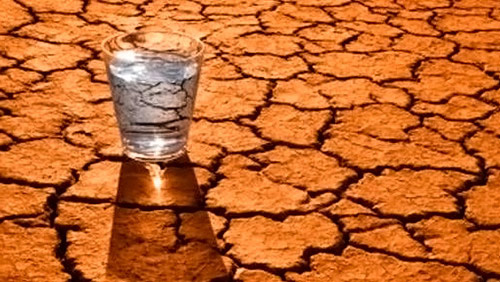The normal course of vital processes both, in a healthy state, and in the cases of illness, regardless of age requires maintaining the stability of the internal environment of the tissues, for example, temperatures, acidity, concentrations of various substances, such as sugar, mineral salts and other. The regulatory apparatus serves to maintain these normal conditions, or the so-called homeostasis. Unfortunately, the regulatory and metabolic processes of elderly people are not as perfect as they used to be at a young age, and perhaps therefore dehydration occurs very often in geriatric patients.
The proportion of water to our body weight is approximately 60%, however this number is slightly larger at a young age that in the elderly. Water is in the blood vessels, in intercellular space and in the cells themselves. Water is a solvent for the salts, proteins, lipids and other substances forming our body. A balance between intake and loss of water indicates about the normal water parameters. Drinking liquid depends on access to its source, from mental factors and the sensitivity of the thirst center, which can be found in the brain.
One should not underestimate the role of water for our body. The insufficient amount of water in the body may result in devastating consequences, causing the development of many diseases. And on the contrary, this state itself – dehydration – can be kind of a signal of the developing diseases. Thuswise it is extremely important to have sufficient information about dehydration.
Dehydration may appear at any age but the most dangerous it is to elderly people and children. That is why it is so significant for caregivers to learn more about the symptoms and reasons of dehydration, and understand how to prevent it.
The main reasons of dehydration
There are several reasons that lead a person to dehydration. Among the major factors of fluid loss can be identified the following:
• long-term overheating in the open sun – heat stroke;
• excessive sweating;
• loss of water due to some gastrointestinal tract diseases -diarrhea, vomiting;
• inadequate nutrition;
• temperature changes during fever;
• increased urine output at different diseases, such as diabetes, Addison’s disease, kidney disease, hyperparathyroidism, incorrect use of diuretics;
• decreased feeling of thirst, and as a result drinking not enough water;
• poor kidney function;
• for disabled or frail seniors – inability to reach a glass of water or sometimes it is just difficult or painful for them to get up from the chair to get some drink.
In a normal state blood plasma is composed of 90% of water. The lack or thickening of blood provokes constriction of peripheral capillaries and vessels, which manifests itself in the hemodynamic disturbances – hypotension, vegetative-vascular disorders or hypertension. In cases when the stage of dehydration is extremely severe, it often ends in death.
Symptoms and signs of dehydration
A major indicator of dehydration is a quick weight loss. In just a few days you can lose up to several pounds. A quick weight loss (when you lose more than 10% of your body’s total weight) is considered severe. The problem is in the fact that very often it is hard to distinguish signs of dehydration from the symptoms of other diseases, but, in general, dehydration has the following signs:
• viscous saliva, dry mouth;
• increased thirst;
• mucous membrane of the eye cannot tear;
• wrinkled skin;
• swings of emotional state – at first excitement, then – sudden irritability;
• a slight dizziness;
• decreased urination, at the same time urine has a dark color;
• cooling of the limbs;
• skin numbness;
• occurrence of muscle cramps.
In severe cases of dehydration you may observe the following signs:
• severe dizziness, which occurs in the supine position;
• changes in behavioral responses – a sharp sense of fear, inattention, embarrassment, etc .;
• lightheadedness, shown after 2 minutes after lifting;
• weakness in limbs, when you cannot get up or move around;
• rapid breathing and weak pulse;
• clammy and cold skin, and sometimes the opposite – hot and dry;
• no urination for more than 12 hours;
• loss of consciousness.
Prevention of dehydration
The danger of dehydration consequences is so high that at times it can cost too much. In order not to expose your body to such endurance it is necessary to prevent possible dehydration in the very first stage. To prevent dehydration some simple recommendations should be followed:
1. In dry weather, during long journeys, active physical activity or high body temperature, always have on hand a bottle of water.
2. Make sure that children and the elderly in your family consume a sufficient amount of fluid per day.
3. Avoid exercise, when the weather is hot and dry.
4. Avoid alcohol, especially in hot weather, because it blocks the ability to feel the symptoms of the first stage of dehydration.
5. In sunny and dry days, try to wear clothing in bright colors, preferably made of natural fabrics and loose-fitting.
6. Try to be in the shade or air-conditioned environments.
7. Healthy eating is also important – the diet should include food containing water, such as fruits, vegetables, soups.
Take care of your loved ones and help them to hydrate normally. And mind, that cases of severe dehydration need an urgent medical attention.




